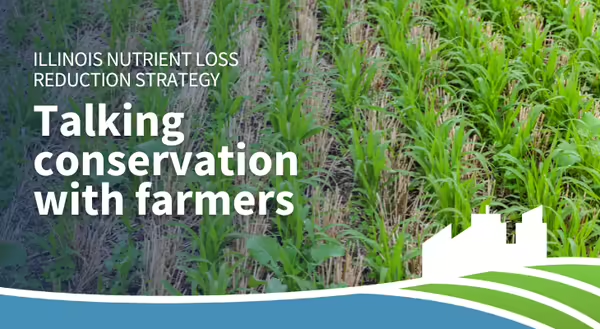
Welcome to the NEW Nutrient Loss Reduction Blog where we explore different conservation practices and work together with farmers to improve water quality in Illinois and beyond. To listen to the full podcast interviews with Chris and Steve go to go.illinois.edu/NLRS_episode48.
Talking to farmers about adopting conservation practices in their operation can be intimidating for both farmers and conservation professionals. There is an understood need to increase conservation practice adoption in Illinois and across the Midwest, but how can we reach those that have been resistant to adoption? In the December 2022 episode of the Illinois Nutrient Loss Reduction Podcast, we talk to Chris Morris, a Ph.D. candidate in Rural Sociology and Sustainable Agriculture at Iowa State University, and Steve Staker, a farmer from Mercer County, Illinois to get some ideas on how to talk to farmers about conservation.
Before joining Iowa State University, Chris worked in Texas as a conservation professional. Chris draws from this experience to guide his Ph.D. research. Chris is currently participating in three different projects focusing on addressing and overcoming barriers to the adoption of conservation practices. The first is looking at the impact of NRCS conservation plans on conservation implementation. Chris found that the relationship between the conservation professional and the farmer was what had the biggest impact on implementation. Chris participated in the Soil and Water Conservation Society Conservation Practitioner Poll across six Midwestern states. The poll found that one-on-one interactions, especially those in the field, contribute the most to the success of conservation adoption. The final project Chris talks about is how farmer trauma (flood, drought, on-farm injuries, etc.) can impact decision-making, particularly when it comes to risk aversion.
Chris identified three main barriers to adoption:
- economics,
- incorporation of new practices to overall farm management
- social pressure.
He explained that many people think that farmers are hesitant to install conservation practices due to potential yield loss and reduced income or the cost of the practice, but his research into farmer trauma has found the reasoning goes a lot deeper than that. Due to, often, thin profit margins, new practices in farm management are a risk and if there is a catastrophic failure it is more than just a loss of income, but potentially the loss of your way of life or the loss of land that has been in the family for generations. Chris points out that the biggest factor in the outcome of adoption is building and maintaining a trusting relationship between the farmer and the conservation professional.
Steve Staker is a farmer from West-Central Illinois and farms 1600 acres in Mercer County, Illinois with his son and brother. They plant cover crops, primarily cereal rye, on 100% of their acres. The original instigator for using cover crops was erosion control because no-till wasn’t enough to hold his soil in place, especially following soybeans. Now they are seeing the co-benefits of using cover crops including weed control and increased biological activity. Due to Steve’s interest in conservation, he recently participated in the Illinois Sustainable Ag Partnership’s Advanced Soil Health Training. The training teaches about different conservation practices that improve soil health and microbiology. Through the training, he is now trying barley as a cover crop ahead of his corn. Steve says that every time he thinks he has cover crops figured out, he realized he doesn’t have it figured out but embraces the challenge.
When asked what advice he would give conservation professionals regarding talking conservation with farmers, he says to be aware of what works to encourage each farmer knowing everyone is different and be able to provide resources to make the conservation practice happen. Also, make sure to make farmers aware of the downside to each practice so the farmer knows exactly what they can expect.
Talking about conservation practice adoption with farmers can be intimidating and challenging knowing there are multiple factors that influence decision-making but building a relationship of trust and honesty between the farmer and conservation professional is critical.
ABOUT THE AUTHORS
Rachel Curry is a Watershed Outreach Associate for two Nitrogen Priority Watersheds (Flint-Henderson and Lower Rock River Watersheds) and is housed in the Galva office of the Henry, Mercer, Rock Island, and Stark Counties Extension Unit. Rachel earned a BS in Environmental Studies from Knox College and an MS in Environmental Science and Soil Science from Iowa State University with an emphasis on soil fertility. She is interested in sharing information on the Illinois Nutrient Loss Reduction Strategy and agricultural conservation practices through discussion and outreach.
Nicole Haverback is a Watershed Outreach Associate for two Phosphorus Priority Watersheds (Embarras and Little Wabash River Watersheds) and is housed in the Effingham office of the Clay, Effingham, Fayette, and Jasper Counties Extension Unit. Nicole earned a BS in Agriculture and Rural Policy Studies from Iowa State University in May of 2022. She is interested in sharing information on the Illinois Nutrient Loss Reduction Strategy and agriculture conservation practices through discussion and outreach.
ABOUT THE BLOG
At Illinois Extension, we’re working to improve water quality at home and downstream. Every month, our watershed outreach associates will bring you stories highlighting agricultural conservation practices, current research projects and results, and from the field farmer interviews. The Nutrient Loss Reduction blog covers conservation practices recommended by the Illinois Nutrient Loss Reduction Strategy, timely updates, farm safety, and new decision tools to help farmers and producers reduce the nutrients leaving their field. Want to get notified when new blog posts are available? Subscribe at go.illinois.edu/SubscribeINLRS.